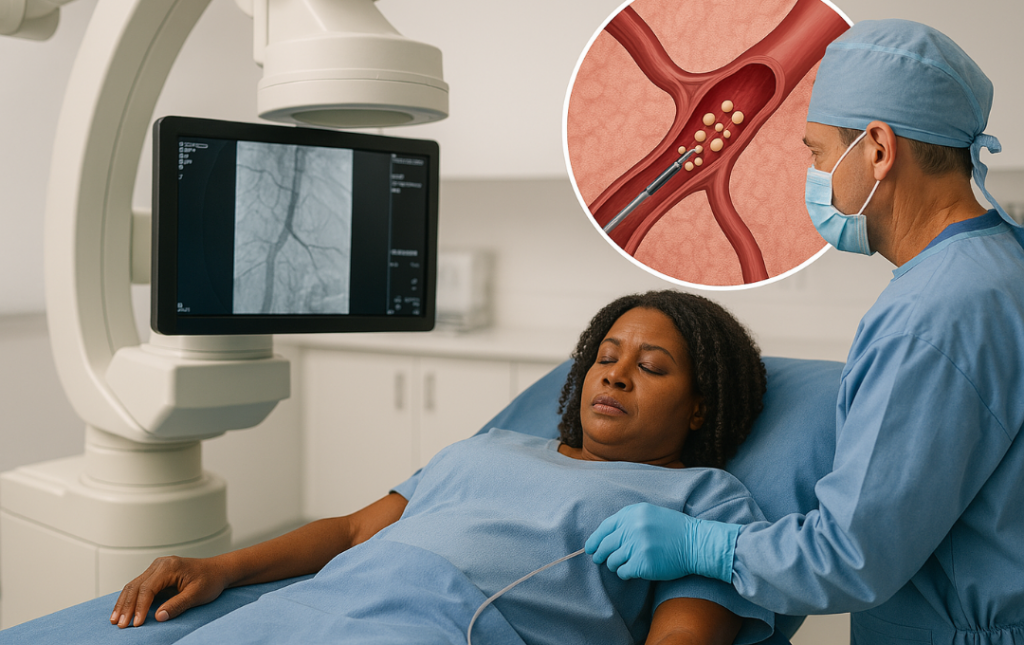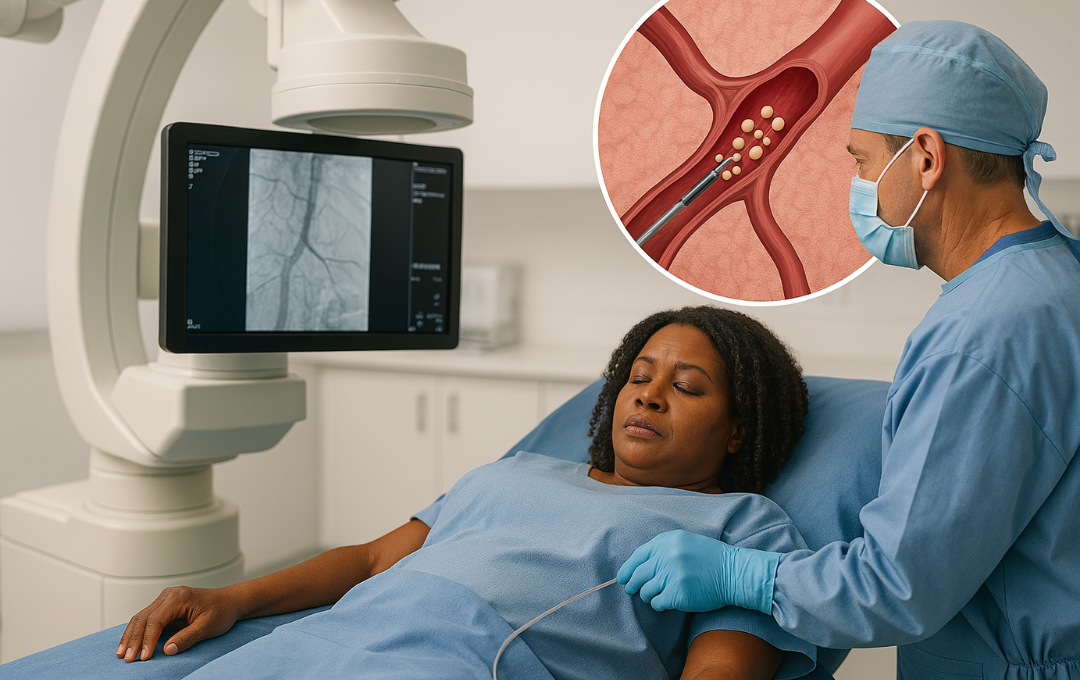If you’ve been diagnosed with hemorrhoids, you may be exploring treatment options to alleviate symptoms, such as pain, swelling, and rectal bleeding. While over-the-counter treatments can offer temporary relief, some cases require medical attention. Common treatments like rubber band ligation or surgery (hemorrhoidectomy) can be recommended for persistent hemorrhoid symptoms, but often come with longer recovery times and potential complications.
Hemorrhoid artery embolization (HAE) is a minimally invasive alternative that targets the source of the problem by reducing blood flow to swollen hemorrhoidal tissue. This blog explores who may be a good candidate for HAE and how it compares to other treatment options.
What is Hemorrhoid Artery Embolization?

Hemorrhoid artery embolization (HAE) is an FDA-approved hemorrhoid treatment that uses advanced imaging and technology to alleviate bleeding and swelling from hemorrhoids. Unlike traditional surgical options, HAE does not require incisions or tissue removal.
Hemorrhoids are swollen blood vessels in the anus, so the purpose of HAE is to limit the hemorrhoid’s blood flow in order to improve symptoms.
During HAE, a physician administers a local anesthesia or sedation and inserts a small catheter into a blood vessel in the wrist or groin. Using real-time imaging, the physician guides the catheter to the superior rectal arteries, the vessels that that supply blood to the hemorrhoids, and injects tiny particles called embolic agents to block the blood flow. This targeted approach reduces bleeding and promotes the gradual shrinking of the hemorrhoidal tissue.
Benefits of HAE
Patients can benefit from HAE in a few ways:
- Minimally invasive: patients leave with nothing more than a small bandage on the insertion site and with minimal to no side effects.
- Effective Symptom Relief: Endovascular Today, a publication dedicated to providing comprehensive coverage of the latest technology, techniques, and developments in the field of endovascular medicine, reports HAE’s success rate is 95 percent.
- Lowered risk of complications: HAE can lower potential complications associated with hemorrhoids, including anemia from blood loss, anal fissures, infection, and blood clots (thrombosed hemorrhoid).
- Less painful than other procedures: Patients have reported mild pain and discomfort during and after HAE.
HAE is performed in an outpatient setting, and patients can return home shortly after treatment, with most experiencing lasting symptom relief.
If you’re ready to take the next step in understanding how HAE could help, just tap below to explore more.
Learn More About HAE’s Benefits
Who Should Consider Hemorrhoid Artery Embolization?

HAE is suitable for many individuals with hemorrhoids, but it’s recommended to get an expert opinion before opting for the procedure. Not all hemorrhoid specialists offer HAE, as it must be performed by an interventional radiologist. This type of specialist will review your symptoms and refer you to an interventional radiologist if HAE may be right for you.
Patients who fall under at least one of the circumstances below would be considered candidates for HAE:
Persistent Hemorrhoid Symptoms
Eating more fiber, using hemorrhoid creams, or soaking the hemorrhoid in warm water (sitz bath) can help heal most hemorrhoids. However, patients who still experience symptoms for longer than a week despite using these methods should consider consulting a doctor about HAE.
Significant Hemorrhoid Bleeding
Bleeding is a common symptom of hemorrhoids, which is the result of increased pressure in the anal blood vessels. This increased pressure causes the arteries and veins to enlarge and blood to pool in the affected area. Straining during a bowel movement can worsen the swollen blood vessels, causing the hemorrhoid to “pop” and bleed. HAE can help reduce the bleeding and prevent hemorrhoids from getting worse.
Prolapsed Hemorrhoids
Hemorrhoids that develop internally can sometimes protrude (prolapse) out of the anus and cause pain and discomfort. A prolapsed hemorrhoid in the early stages can come out during a bowel movement and retract on its own. As it progresses, the prolapsed hemorrhoid may need to be manually pushed back in if it hasn’t become permanently prolapsed. HAE can help shrink the prolapsed hemorrhoid, with patients noticing improvement within a couple of weeks.
Not Suited for Other Hemorrhoid Procedures
Some patients may have already tried other minimally invasive hemorrhoid procedures, such as rubber band ligation, with no luck in reducing symptoms. In fact, some patients will need additional rubber band ligation treatments after their first session. The National Institutes of Health says that patients who required more than four sessions of rubber banding had a higher failure rate, meaning they would need surgery to remove the hemorrhoid.
Additionally, patients on blood thinners or with a large, prolapsed hemorrhoid may not be suitable candidates for other non-surgical procedures.
Patients on blood thinners or with a large hemorrhoid should discuss HAE with a specialist to determine if the procedure is right for them.
Does Insurance Cover Hemorrhoid Artery Embolization?
Hemorrhoid artery embolization (HAE) is typically covered by most health insurance plans, including Medicare and Medicaid. Coverage is based on the fact that HAE is considered medically necessary for individuals experiencing chronic or severe hemorrhoid symptoms.
Persistent hemorrhoids can lead to serious complications such as anemia, blood clots, and localized infections. Because HAE offers a safe, effective, and non-surgical treatment option, it is often approved by insurers as part of a comprehensive care plan.
To confirm your coverage, speak with a care coordinator at USA Hemorrhoid Centers.
Do I Need a Referral for Hemorrhoid Artery Embolization?
You may need a referral for HAE depending on the kind of health insurance you have. Some health insurance providers require a referral to ensure your minimally invasive hemorrhoid treatment is covered. Contact your health insurance provider to check your coverage and determine if you need a referral.
HAE at USA Hemorrhoid Centers

Hemorrhoids may be uncomfortable to talk about but addressing them with a qualified specialist can lead to significantly improved health outcomes. USA Hemorrhoid Centers’ team of highly skilled physicians provides comprehensive evaluations and treatment plans – including HAE, a non-surgical outpatient procedure designed to reduce symptoms without incisions or lengthy recovery times.
As an AAAHC-accredited provider, we prioritize patient safety, comfort, and dignity. With over 25 convenient locations nationwide, expert hemorrhoid care is never far from home.
USA Hemorrhoid Centers accepts most health insurance plans, including Medicare and Medicaid. Patients can verify their insurance during the scheduling process, either online or by speaking with a member of our Care Team.
Take the first step toward relief- schedule your consultation today.









